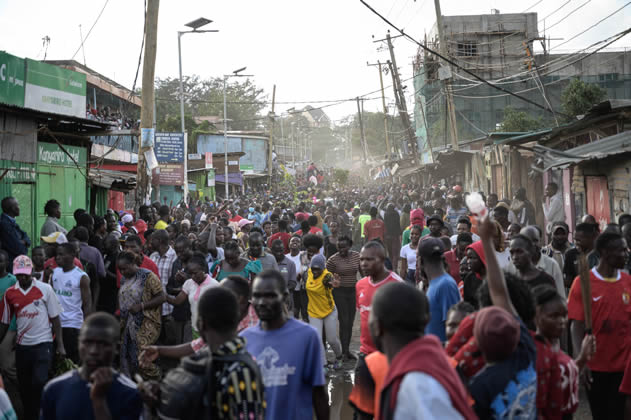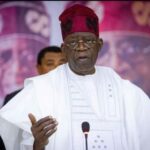
The veteran politician has called for protests every Monday and Thursday, accusing President William Ruto of stealing last year’s election and of failing to control the surging cost of living.
The protesters defied a warning by the Inspector General of Police, Japhet Koome, that the demonstrations in Nairobi and in Odinga’s stronghold of Kisumu were “illegal”.
One man was shot dead in Kisumu, the head of the western Kenyan city’s main hospital told AFP, the second fatality reported since the demonstrations kicked off last Monday when a university student was killed by police fire.
“One person was shot dead. He is unknown, he is a young man,” said George Rae, CEO of Jaramogi Oginga Odinga Teaching & Referral Hospital, without elaborating.
Police deployed tear gas in Nairobi and Kisumu to disperse crowds, firing canisters at cars carrying journalists in the capital.
Officers also used tear gas and water cannon as Odinga’s convoy moved through a congested neighbourhood in Nairobi, sending people running for cover.
– ‘Prices must come down’ –
“How many support the demonstrations? How many here are saying the price of basic commodities should go down, maize flour should go down, cooking oil, school fees and other commodities must come down?” Odinga said as supporters thronged his vehicle.
Clashes also erupted in the city’s biggest slum Kibera, with protesters setting tyres ablaze and gangs assaulting journalists.
Hundreds of looters descended on former president Uhuru Kenyatta’s vast farm on the outskirts of Nairobi, stealing sheep and cutting trees before setting a section of the property on fire, local broadcaster NTV reported.
Kenyatta backed Odinga’s candidacy in the presidential poll in August last year after falling out with his former deputy Ruto.
Gangs also targeted Odinga’s gas company Spectre International Ltd in Nairobi, he said.
“They are cowards. They have sent thugs to raid the farm of Uhuru Kenyatta and my company,” Odinga said.
“That is an act of stupidity and ignorance,” he added, blaming the government for the chaos.
– ‘Mother of all demonstrations’ –
Thirty-one officers were injured in last week’s running battles between riot police and demonstrators, and more than 200 people were arrested, including several senior opposition politicians.
Odinga’s convoy was also hit in last week’s protests.
The demonstrations are the first major outbreak of political unrest since Ruto took office more than six months ago.
Despite the police ban, Odinga called Sunday on Kenyans to join what he described as “the mother of all demonstrations”.
“I want to tell Mr Ruto and the IG Koome that we are not going to be intimidated,” he said. “We are not going to fear tear gas and police.”
The Media Council of Kenya condemned the violence against journalists, warning that such attacks “demean the spirit of mass action as it betrays the foundations of democracy on which it is founded”.
Ruto, who is currently on a four-day trip to Germany and Belgium, has urged his rival to halt the demonstrations.
“I am telling Raila Odinga that if he has a problem with me, he should face me and stop terrorising the country,” he said Thursday.
– ‘Sleep hungry’ –
Many Kenyans are struggling to put food on the table, battling high prices for basic goods as well as a plunging local currency and a record drought that has left millions hungry.
“If the leaders don’t talk, it is us who are affected. They are rich people, it is us who will sleep hungry,” motorcycle taxi driver Collins Kibe told AFP.
During the election campaign, Ruto portrayed himself as champion of the downtrodden and vowed to improve the lot of ordinary Kenyans.
But critics say he has broken several campaign promises and has removed subsidies for fuel and maize flour — a dietary staple.
Kenya’s energy regulatory body has also announced a hike in electricity prices from April, despite Ruto insisting in January there would be no such increase.
Last week’s protests proved costly, with Deputy President Rigathi Gachagua saying the economy had lost at least $15 million.
AFP





